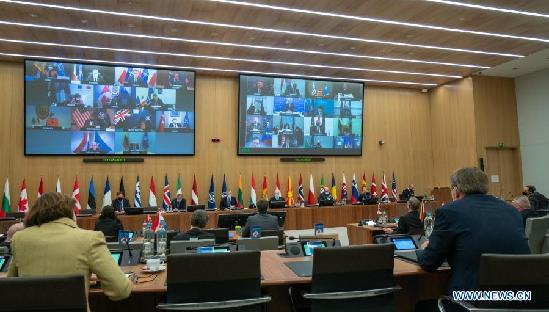
It is reported that defense ministers of the 30 NATO member states held a meeting in video format on February 17-18, the highest level and also the first of its kind since Joe Biden was elected US president, during which the so-called “China and Russia threats” were among the key topics. Apparently, NATO could not wait to turn its spears toward China and Russia even when the COVID-19 pandemic was still raging – a move that reflected some western countries’ intention of resolving their internal problems by fabricating external enemies.
Being a military alliance formed during the Cold War to counter the Soviet Union and the Warsaw Pact, NATO is an important bond across the Atlantic Ocean, but the international situation has long changed. With the Collapse of the Soviet Union, NATO’s legitimacy is challenged with the imaginary enemy gone. Besides, since the nature of this military bloc makes it a square peg in a round hole in today’s world, themed with peace and development, NATO must “re-form” new adversaries to get itself out of the awkward position.
On the one hand, NATO continues to label Russia as a rival; on the other hand, the military bloc has turned its eyes to China which is marching onto the center of the international stage with a brand new outlook.
For a very long time, there was not much intercourse between Beijing and Brussels. In the new century, however, with the fast-changing international environment and China’s rapid development, NATO had gradually realized that China’s growing influence and its diplomatic policy had become the alliance’s common challenge, and it is glad to tag along when the US vowed to get back to “major power competition”. NATO put China on the meeting agenda and statement for the first time at the London Summit in December 2019.
The report titled “NATO 2030” released on December 1, 2020, outlining the pathway for the bloc’s reform in the next decade, stressed that NATO “must think more carefully about how to cope with China and its military build-ups” even though Russia will most likely remain the main military threat to the alliance in the next ten years. NATO Secretary-General Jens Stoltenberg said before the defense ministers’ meeting that the meeting would have broad discussions about “threats from China and Russia” because they “are at the forefront of an authoritarian pushback against rules-based international order”. He also claimed NATO members should consult more extensively when dealing with “a more assertive Russia and the consequence of the rise of China”, including consultations on the military, economic, technological, and security issues within the alliance. Clearly, NATO’s policies have remained consistent and viewing China as a “threat” may become its long-term policy.
That the NATO defense summit mentioned “China and Russia threats” again had a lot to do with Biden’s election. Trump presidency insisted on “America first”, called NATO outdated, asked its allies to bear all expenses for America’s stationed troops, and linked their sharing of responsibilities with America’s fulfillment of its commitment to NATO – moves that have seriously damaged US relations with its allies. After Biden took office, however, his promise to strengthen cooperation with allies gave NATO hope to mend their relations. Reuters quoted American officials as saying that the US defense secretary Austin will emphasize Washington’s commitment to NATO and how much it values the trans-Atlantic partnership.
NATO believes that highlighting its anti-China and anti-Russia stance will not only cement its internal cohesion but also tighten the ties with the US. What it doesn’t see is that such a move may expedite its internal split. There are many people of vision within the alliance. Some member states don’t see China as a threat. Although they feel disturbed by its competition in the economic domain, the country is far away as far as traditional security is concerned. Some European countries have adopted a policy different from America’s regarding the development of the 5G mobile communications network and in many other fields. Germany and France, in particular, two important US allies in NATO, have made clear on several significant occasions that they would not be at America’s beck and call. French President Macron even said bluntly NATO’s common enemy is terrorism, not Moscow or Beijing.
That being said, NATO’s decision to target China and Russia to solve its problems runs counter to the development trend of times and will cost the alliance more than it gains.
(The author is a research fellow at both Yuan Wang think tank, a Beijing-based military science and technology institute, and Charhar Institute, and also a member of the Chinese Institute of Command and Control.)
Editor's note: This article is originally published on www.china.com.cn, then translated from Chinese into English and edited by the China Military Online. The information, ideas or opinions appearing in this article do not necessarily reflect the views of eng.chinamil.com.cn.













